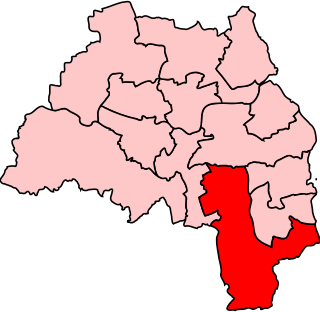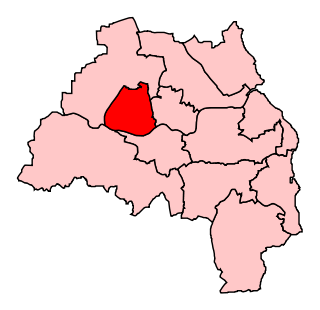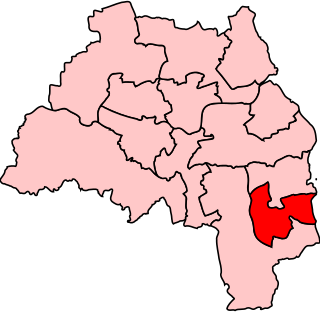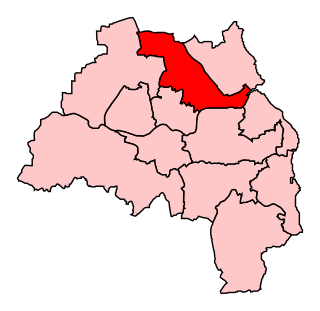
Hexham is a constituency in Northumberland represented in the House of Commons of the UK Parliament since 2024 by Joe Morris of the Labour Party. As with all constituencies, the constituency elects one Member of Parliament (MP) by the first past the post system of election at least every five years.

Portsmouth South is a constituency represented in the House of Commons of the UK Parliament since 2017 by Stephen Morgan of the Labour Party. Morgan is the first Labour MP to represent the seat.

Gateshead East and Washington West was a parliamentary constituency represented in the House of Commons of the Parliament of the United Kingdom from 1997 to 2010. It elected one Member of Parliament (MP) by the first past the post electoral system.

Houghton and Washington East was, from 1997 until 2010, a constituency represented in the House of Commons of the Parliament of the United Kingdom. It elected one Member of Parliament (MP) by the first past the post system of election. A seat with similar boundaries, Houghton and Washington, existed from 1983 until 1997.

Newcastle upon Tyne Central was a constituency represented in the House of Commons of the UK Parliament from 2010 until its abolition for the 2024 general election by Chi Onwurah of the Labour Party. As with all constituencies since 1950, the constituency elected one Member of Parliament (MP) by the first past the post system of election at least every five years.

Newcastle upon Tyne North is a constituency represented in the House of Commons of the UK Parliament since 2010 by Catherine McKinnell of the Labour Party.

Sunderland North was a borough constituency represented in the House of Commons of the Parliament of the United Kingdom from 1950 to 2010. It elected one Member of Parliament (MP) by the first past the post system of election.

Sunderland South was, from 1950 until 2010, a constituency represented in the House of Commons of the Parliament of the United Kingdom. It elected one Member of Parliament (MP) by the first past the post system of election.

Tynemouth is a constituency in Tyne and Wear represented in the House of Commons of the UK Parliament since 1997 by Sir Alan Campbell, a member of the Labour Party.

North Tyneside was a constituency represented in the House of Commons of the UK Parliament since its creation in 1997 until its abolition for the 2024 general election by members of the Labour Party.

Twickenham is a constituency in Greater London represented in the House of Commons of the UK Parliament since 2019 by Munira Wilson of the Liberal Democrats.

Finchley and Golders Green is a constituency created in 1997. It is represented in the House of Commons of the UK Parliament by Sarah Sackman of the Labour Party.
The ceremonial county of Tyne and Wear is divided into 13 parliamentary constituencies, including 2 cross-county boundary seats with Northumberland and one with Durham, of which 9 are borough constituencies and 4 county constituencies. As of the 2024 general election, all 13 are represented by the Labour Party.

Washington and Sunderland West was a constituency in Tyne and Wear represented in the House of Commons of the UK Parliament since its 2010 creation until its abolition for the 2024 general election by Sharon Hodgson, a member of the Labour Party.

Houghton and Sunderland South is a constituency in Tyne and Wear represented in the House of Commons of the Parliament of the United Kingdom. Since its creation in 2010, the seat has been represented by Bridget Phillipson of the Labour Party, who currently serves as Secretary of State for Education under the government of Keir Starmer.

Newcastle upon Tyne East was a constituency of the House of Commons of the UK Parliament. It was held by Nick Brown, an independent formerly of the Labour Party, from its recreation in 2010 until its abolition for the 2024 general election.

The 2008 Sunderland Council election took place on 1 May 2008 to elect members of Sunderland Metropolitan Borough Council in Tyne and Wear, England. One third of the council was up for election and the Labour Party stayed in overall control of the council.

The 2010 Sunderland Council election took place on 6 May 2010 to elect members of Sunderland Metropolitan Borough Council in Tyne and Wear, England. One third of the council was up for election and the Labour Party stayed in overall control of the council. The election took place on the same day as the 2010 General Election.

The 1973 Tyne and Wear County Council election was held on 12 April 1973 as part of the first elections to the new local authorities established by the Local Government Act 1972 in England and Wales. 104 councillors were elected from 95 electoral divisions across the region's five boroughs. Each division returned either one or two county councillors each by First-past-the-post voting for a four-year term of office. The election took place ahead of the elections to the area's metropolitan borough councils, which followed on 10 May 1973.



















